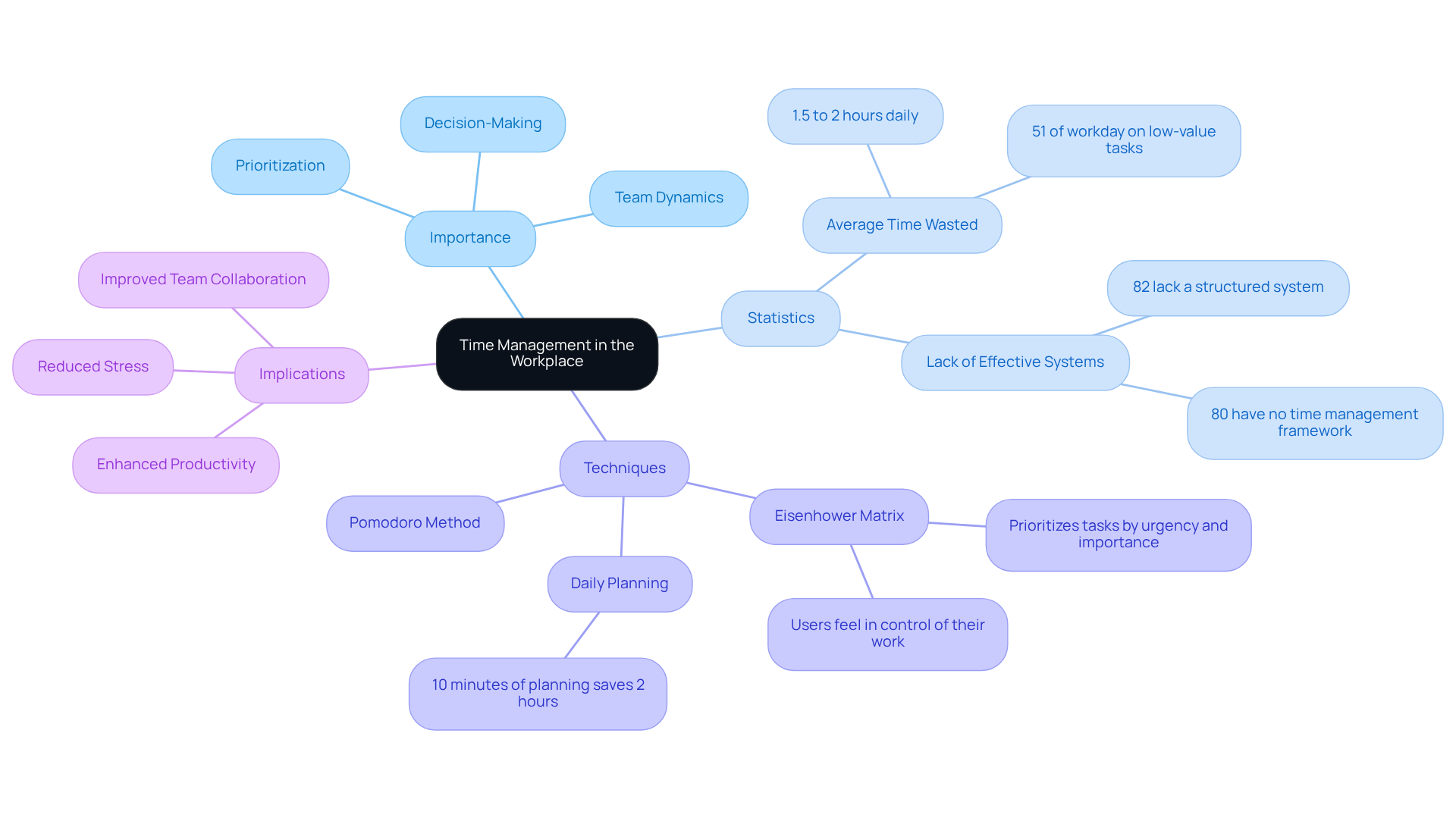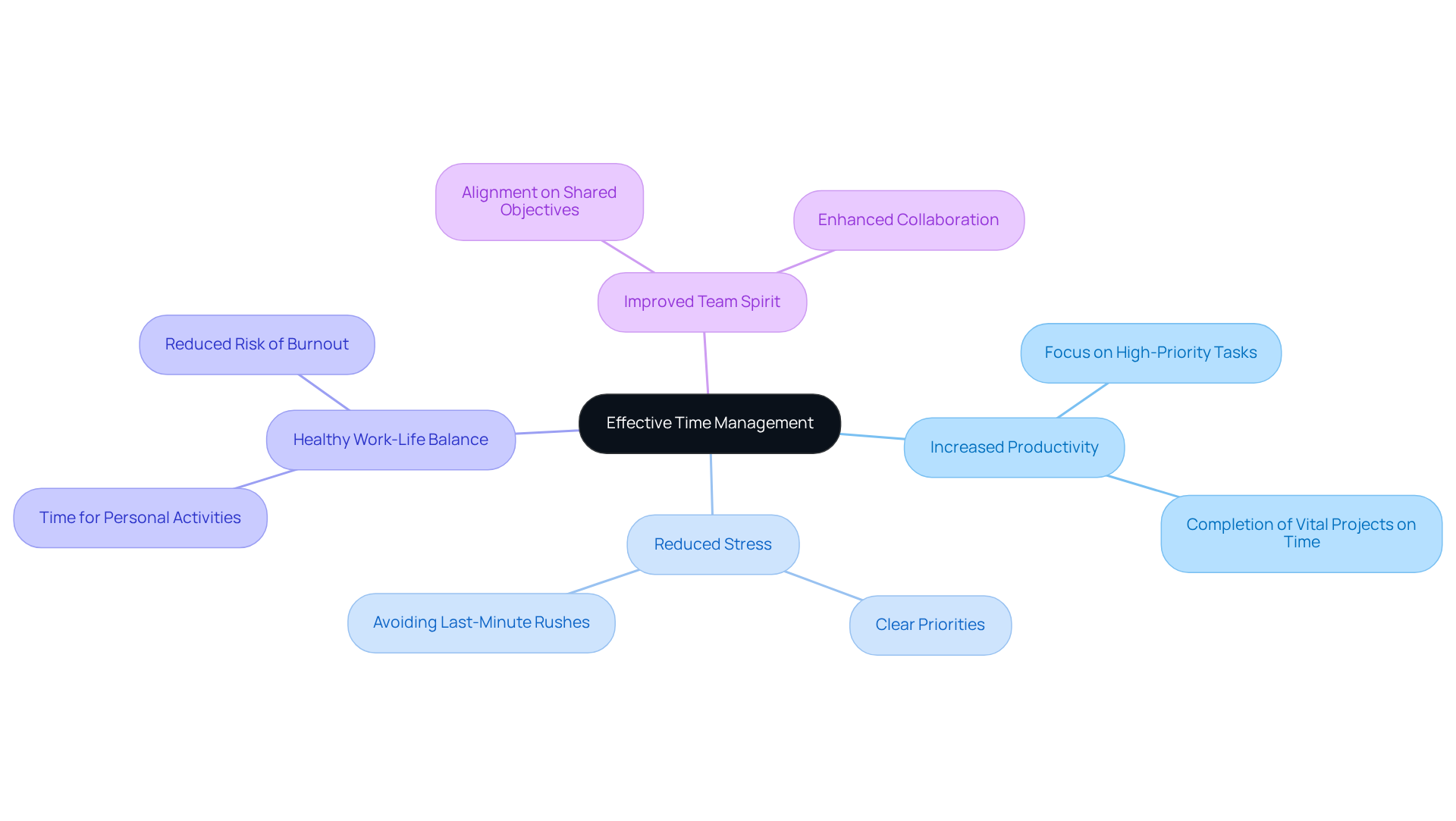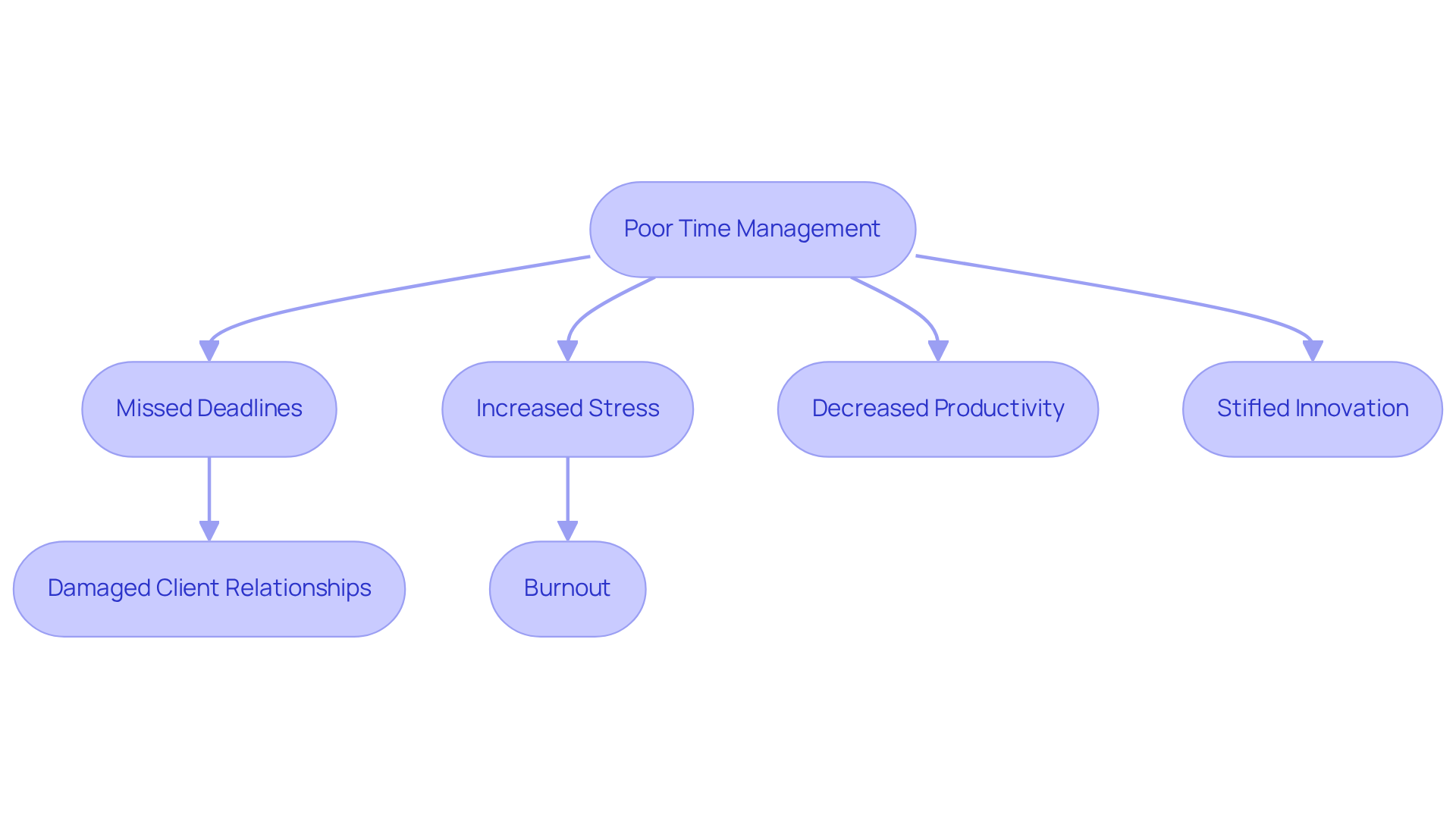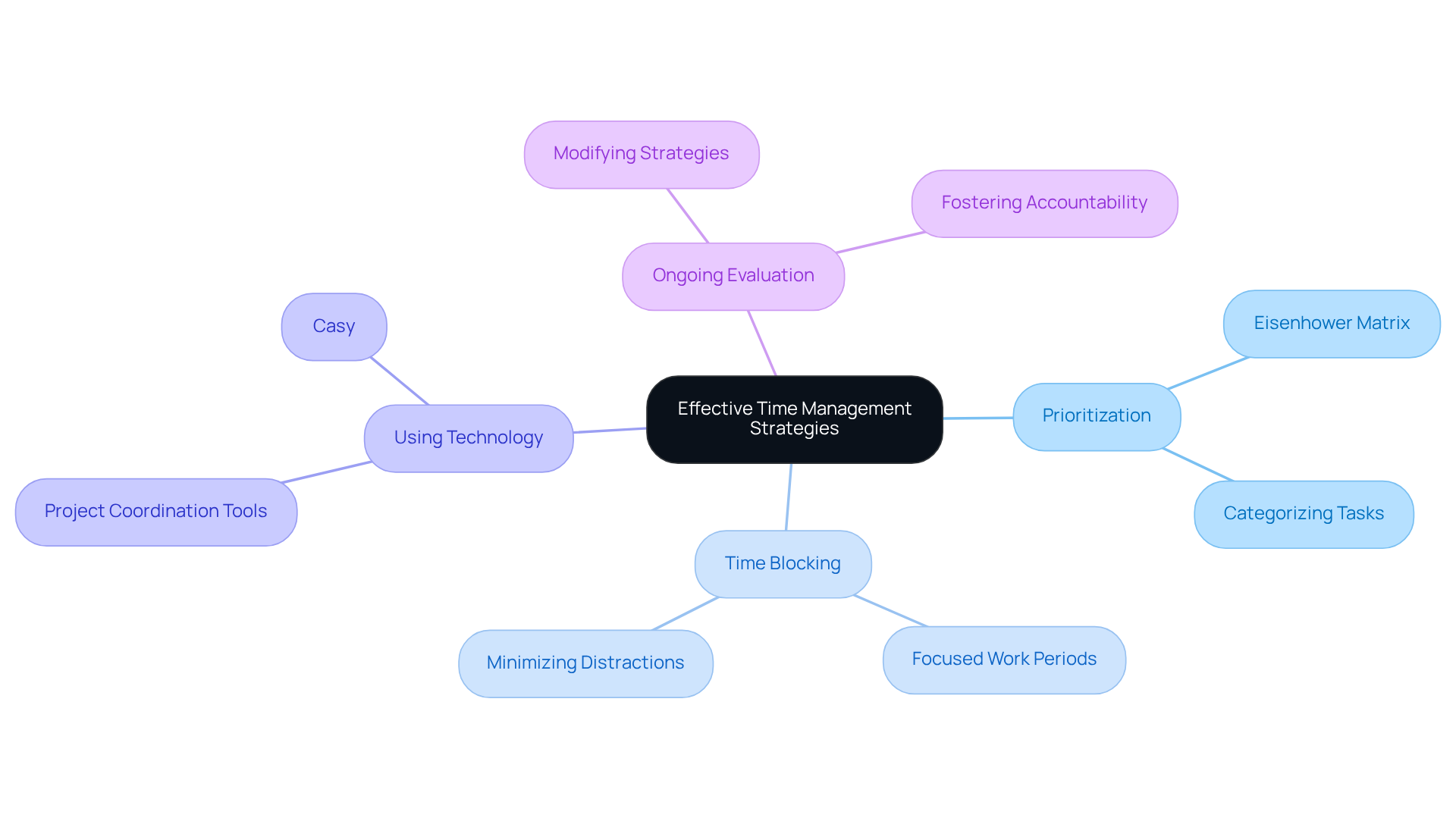Overview
Time management stands as a cornerstone in the workplace for startups, facilitating efficient task prioritization and resource allocation—both vital in high-stakes environments characterized by limited resources. Effective time management not only enhances productivity but also improves decision-making and fosters a healthier work-life balance. These elements are crucial for driving the success of a startup.
Consider this: how often do you find yourself overwhelmed by competing tasks? By mastering time management, you can transform chaos into order, allowing your startup to thrive. The ability to prioritize effectively can lead to significant gains in productivity, making it an indispensable skill for any founder.
In conclusion, embracing time management strategies is not merely beneficial; it is essential for the sustainable success of your startup. Take action now—evaluate your current practices and implement changes that will lead to improved outcomes and a more balanced approach to work and life.
Introduction
In the dynamic landscape of startups, where every second holds the potential for innovation or setback, the significance of time management is paramount. Efficiently organizing time not only enhances productivity but also serves as a lifeline for fledgling businesses navigating limited resources and intense competition.
Yet, studies reveal that many individuals squander hours daily on non-essential tasks. This raises a critical question: how can startups implement effective time management strategies to reclaim lost productivity and drive their ventures toward success?
The answer lies in recognizing that mastering time management is not merely beneficial; it is essential for survival and growth in today’s fast-paced environment.
Define Time Management and Its Workplace Relevance
The organization of hours is not just a method; it illustrates why time management is important in the workplace as a critical strategy for planning and exerting deliberate control over the duration allocated to specific activities. In the fast-paced world of startups, one must recognize why time management is important in the workplace due to limited resources and high stakes. Every moment counts in these environments, illustrating why time management is important in the workplace, as it makes it essential to prioritize tasks and allocate resources wisely. Did you know that workers waste an average of 1.5 to 2 hours daily on non-work-related tasks? This statistic underscores why time management is important in the workplace, emphasizing the urgent need for organized management practices. By implementing efficient schedules, startup founders can illustrate why time management is important in the workplace, ensuring that vital tasks are completed, deadlines are met, and overall productivity is maximized.
In the chaotic realm of startups, one must consider why time management is important in the workplace to avoid inefficiency that arises from the absence of established processes. Research reveals that 82% of individuals lack an effective scheduling system, highlighting why time management is important in the workplace, as it leads to 51% of their workday being spent on less important tasks. Imagine the impact of applying strategic scheduling methods—potentially reclaiming 20% of work hours and significantly enhancing productivity, highlighting why time management is important in the workplace. Techniques like the Eisenhower Matrix, recognized as one of the most effective scheduling systems, help explain why time management is important in the workplace by prioritizing activities based on urgency and importance, demonstrating a clear path toward improved control over work.
Furthermore, studies show that individuals who grasp why time management is important in the workplace are 57% more likely to complete assignments on time. For new business creators, exploring why time management is important in the workplace extends beyond mere productivity; it shapes decision-making and team dynamics. Enhanced scheduling can lead to better decision-making, highlighting why time management is important in the workplace, with 83% of professionals acknowledging its role in elevating their reputation.
By fostering a culture of purposeful productivity, founders demonstrate why time management is important in the workplace, as it enhances their own efficiency while boosting team collaboration and morale, propelling their ventures toward success. Are you ready to take control of your time and drive your startup forward?

Explore the Benefits of Effective Time Management
Efficient scheduling offers a multitude of advantages, particularly for startups. It significantly boosts productivity, highlighting why time management is important in the workplace, enabling teams to focus on high-priority tasks and ensuring that vital projects are completed on time.
Have you considered how clear priorities can alleviate stress? By establishing well-defined deadlines, teams can learn why time management is important in the workplace, as it helps them avoid the chaos of last-minute rushes and missed deadlines.
Furthermore, it is essential to understand why time management is important in the workplace, as efficient scheduling fosters a healthier work-life balance, allowing employees to allocate time for personal activities and reducing the risk of burnout.
Startups that implement effective scheduling practices often witness improved team spirit and collaboration, as all members align on shared objectives and timelines.

Identify Challenges and Consequences of Poor Time Management
Ineffective scheduling poses significant obstacles and adverse effects for new businesses. Have you considered how missed deadlines can damage client relationships and tarnish your startup's reputation? Poor organization of schedules often leads to heightened stress levels among team members, resulting in burnout and decreased job satisfaction. Furthermore, startups may experience a drop in productivity, as employees find themselves occupied with low-priority tasks rather than focusing on strategic initiatives. This reactive work atmosphere, where teams are constantly addressing urgent issues, prevents proactive preparation for upcoming projects. Such a cycle of inefficiency not only stifles innovation but also hinders growth, which raises the question of why time management is important in the workplace as a crucial component for success.

Implement Strategies for Effective Time Management
Startup founders can adopt several best practices to understand why time management is important in the workplace, which will significantly enhance their operational efficiency through effective schedule management strategies. One key approach is prioritization, where activities are categorized based on urgency and importance, often utilizing tools like the Eisenhower Matrix. Have you considered how prioritizing tasks can streamline your workflow and reduce overwhelm?
Another effective method for understanding why time management is important in the workplace is time blocking, which entails scheduling specific periods for focused work on particular activities, thereby minimizing distractions. This technique not only enhances productivity but also illustrates why time management is important in the workplace by fostering a disciplined work environment.
Furthermore, utilizing technology, such as project coordination tools like Casy, can automate task tracking and reminders, alleviating the administrative burden on teams. Imagine the time saved when routine tasks are automated!
Consistently evaluating and modifying strategies according to progress and evolving priorities is essential for sustaining agility in a new business environment. By fostering a culture of accountability and encouraging open communication about why time management is important in the workplace, startups can create a more cohesive and efficient team dynamic.

Conclusion
Effective time management in the workplace is essential for the success of startups. Entrepreneurs who grasp the importance of managing time wisely can adeptly navigate the challenges posed by limited resources and high-pressure environments. By prioritizing tasks, implementing structured schedules, and fostering a culture of accountability, startups not only enhance productivity but also contribute to their overall growth and sustainability.
This article underscores various facets of time management, highlighting its benefits such as:
- Increased productivity
- Improved team morale
- The ability to maintain a healthy work-life balance
Strategies like the Eisenhower Matrix and time blocking can help startups streamline operations and mitigate the risks associated with poor scheduling practices. The potential repercussions of ineffective time management—including a diminished reputation and team burnout—further stress the necessity for organized management practices.
Ultimately, mastering time management transcends merely completing tasks efficiently; it involves cultivating an environment where innovation can flourish and teams can collaborate effectively. Startups that prioritize time management are strategically positioned to achieve their goals and propel their ventures toward success. By embracing these practices, teams can transform their operations, leading to lasting improvements and a competitive edge in the market.
Frequently Asked Questions
What is time management and why is it important in the workplace?
Time management is the organization of hours to plan and control the duration allocated to specific activities. It is important in the workplace as it helps prioritize tasks, allocate resources wisely, and maximize productivity, especially in fast-paced environments like startups.
How much time do workers typically waste on non-work-related tasks?
Workers waste an average of 1.5 to 2 hours daily on non-work-related tasks, highlighting the need for organized time management practices.
What percentage of individuals lack an effective scheduling system?
Research reveals that 82% of individuals lack an effective scheduling system, which contributes to inefficiency in their workday.
How does poor time management affect work productivity?
Due to ineffective scheduling, individuals spend 51% of their workday on less important tasks, which can lead to significant losses in productivity.
What is the Eisenhower Matrix and how does it relate to time management?
The Eisenhower Matrix is a scheduling system that prioritizes activities based on urgency and importance. It helps individuals reclaim work hours and improve control over their tasks, underscoring the importance of time management.
What impact does understanding time management have on assignment completion?
Individuals who understand the importance of time management are 57% more likely to complete assignments on time.
How does time management influence decision-making and team dynamics?
Effective time management enhances decision-making and team dynamics, with 83% of professionals acknowledging its role in improving their reputation.
What are the benefits of fostering a culture of purposeful productivity in a startup?
Fostering a culture of purposeful productivity enhances efficiency, boosts team collaboration and morale, and propels the startup toward success.




